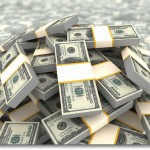
Economist Richard Duncan* explains why he thinks the Federal Reserve will soon be launching another round of quantitative easing (QE) .. in recent years,QE has been allowing the government to finance its deficit spending at very low interest rates (financial repression) .. over the last few years, the U.S. government has borrowed approximately $5.8 trillion to finance its budget deficits – during that time, the Fed acquired $1.9 trillion worth of government bonds: If the Fed had not bought those bonds, either the government would have had to spend $1.9 trillion less, which would have removed $1.9 trillion of aggregate demand from the economy, or else the government would have had to borrow the $1.9 trillion from the financial markets. That would have drained liquidity from the system and pushed up interest rates Higher interest rates would have further damaged the economy – “QE allowed the government to boost aggregate demand through deficit spending and to finance its deficit spending at very low interest rates.” .. the Fed also bought mortgage debt to stop the collapse in property prices .. Duncan sees the stock market runup as being fueled by QE, helping to relfate the economy .. “It is not at all certain, however, that the economy will remain ‘reflated’ when QE ends in October. In fact, the odds are quite high that it will begin to deflate again. Should that occur, the Fed would then have to decide whether to do nothing and allow everything it has accomplished to unravel in a process most probably leading back to severe recession and deflation or else to launch yet another round of Quantitative Easing. I believe it will be an easy decision for the Fed to make.After all, what’s a few trillion dollars more (shared) among friends?”
– Economist Richard Duncan




 09/13/2014 - Quantitative Easing (QE) Allowing Governments To Finance Its Deficit Spending At Very Low Interest Rates
09/13/2014 - Quantitative Easing (QE) Allowing Governments To Finance Its Deficit Spending At Very Low Interest Rates


